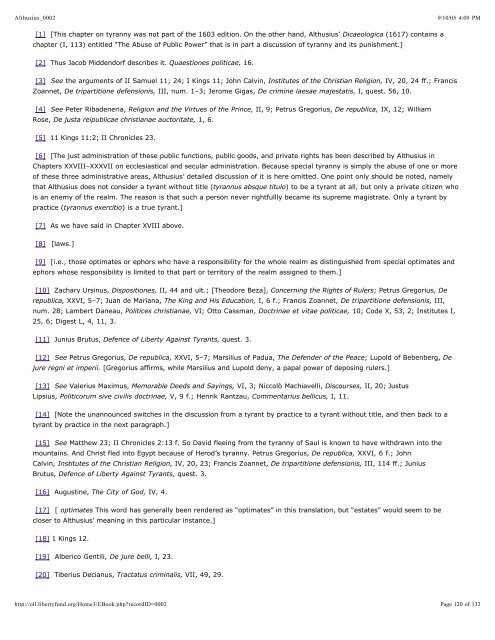Johannes Althusius: Politica - Hubertlerch.com - HubertLerch.com
Johannes Althusius: Politica - Hubertlerch.com - HubertLerch.com
Johannes Althusius: Politica - Hubertlerch.com - HubertLerch.com
Create successful ePaper yourself
Turn your PDF publications into a flip-book with our unique Google optimized e-Paper software.
<strong>Althusius</strong>_0002<br />
9/10/05 4:09 PM<br />
[1] [This chapter on tyranny was not part of the 1603 edition. On the other hand, <strong>Althusius</strong>’ Dicaeologica (1617) contains a<br />
chapter (I, 113) entitled “The Abuse of Public Power” that is in part a discussion of tyranny and its punishment.]<br />
[2] Thus Jacob Middendorf describes it. Quaestiones politicae, 16.<br />
[3] See the arguments of II Samuel 11; 24; I Kings 11; John Calvin, Institutes of the Christian Religion, IV, 20, 24 ff.; Francis<br />
Zoannet, De tripartitione defensionis, III, num. 1–3; Jerome Gigas, De crimine laesae majestatis, I, quest. 56, 10.<br />
[4] See Peter Ribadeneria, Religion and the Virtues of the Prince, II, 9; Petrus Gregorius, De republica, IX, 12; William<br />
Rose, De justa reipublicae christianae auctoritate, 1, 6.<br />
[5]<br />
11 Kings 11:2; II Chronicles 23.<br />
[6] [The just administration of these public functions, public goods, and private rights has been described by <strong>Althusius</strong> in<br />
Chapters XXVIII–XXXVII on ecclesiastical and secular administration. Because special tyranny is simply the abuse of one or more<br />
of these three administrative areas, <strong>Althusius</strong>’ detailed discussion of it is here omitted. One point only should be noted, namely<br />
that <strong>Althusius</strong> does not consider a tyrant without title ( tyrannus absque titulo) to be a tyrant at all, but only a private citizen who<br />
is an enemy of the realm. The reason is that such a person never rightfullly became its supreme magistrate. Only a tyrant by<br />
practice ( tyrannus exercitio) is a true tyrant.]<br />
[7]<br />
[8]<br />
As we have said in Chapter XVIII above.<br />
[laws.]<br />
[9]<br />
[i.e., those optimates or ephors who have a responsibility for the whole realm as distinguished from special optimates and<br />
ephors whose responsibility is limited to that part or territory of the realm assigned to them.]<br />
[10] Zachary Ursinus, Dispositiones, II, 44 and ult.; [Theodore Beza], Concerning the Rights of Rulers; Petrus Gregorius, De<br />
republica, XXVI, 5–7; Juan de Mariana, The King and His Education, I, 6 f.; Francis Zoannet, De tripartitione defensionis, III,<br />
num. 28; Lambert Daneau, Politices christianae, VI; Otto Cassman, Doctrinae et vitae politicae, 10; Code X, 53, 2; Institutes I,<br />
25, 6; Digest L, 4, 11, 3.<br />
[11] Junius Brutus, Defence of Liberty Against Tyrants, quest. 3.<br />
[12] See Petrus Gregorius, De republica, XXVI, 5–7; Marsilius of Padua, The Defender of the Peace; Lupold of Bebenberg, De<br />
jure regni et imperii. [Gregorius affirms, while Marsilius and Lupold deny, a papal power of deposing rulers.]<br />
[13] See Valerius Maximus, Memorable Deeds and Sayings, VI, 3; Niccolò Machiavelli, Discourses, II, 20; Justus<br />
Lipsius, Politicorum sive civilis doctrinae, V, 9 f.; Henrik Rantzau, Commentarius bellicus, I, 11.<br />
[14]<br />
[Note the unannounced switches in the discussion from a tyrant by practice to a tyrant without title, and then back to a<br />
tyrant by practice in the next paragraph.]<br />
[15] See Matthew 23; II Chronicles 2:13 f. So David fleeing from the tyranny of Saul is known to have withdrawn into the<br />
mountains. And Christ fled into Egypt because of Herod’s tyranny. Petrus Gregorius, De republica, XXVI, 6 f.; John<br />
Calvin, Institutes of the Christian Religion, IV, 20, 23; Francis Zoannet, De tripartitione defensionis, III, 114 ff.; Junius<br />
Brutus, Defence of Liberty Against Tyrants, quest. 3.<br />
[16] Augustine, The City of God, IV, 4.<br />
[17] [ optimates This word has generally been rendered as “optimates” in this translation, but “estates” would seem to be<br />
closer to <strong>Althusius</strong>’ meaning in this particular instance.]<br />
[18] 1 Kings 12.<br />
[19] Alberico Gentili, De jure belli, I, 23.<br />
[20] Tiberius Decianus, Tractatus criminalis, VII, 49, 29.<br />
http://oll.libertyfund.org/Home3/EBook.php?recordID=0002<br />
Page 120 of 132







